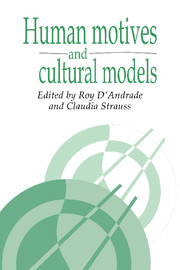Book contents
- Frontmatter
- Contents
- List of illustrations
- Preface
- List of contributors
- 1 Models and motives
- Part I Cultural models as motives
- Part II How do cultural models become motives?
- 4 How cultural systems become desire: a case study of American romance
- 5 The motivational force of self-understanding: evidence from wives' inner conflicts
- 6 The directive force of morality tales in a Mexican community
- 7 Learning to be an American parent: how cultural models gain directive force
- Part III Cultural models as motives reconsidered
- Index
4 - How cultural systems become desire: a case study of American romance
Published online by Cambridge University Press: 05 June 2012
- Frontmatter
- Contents
- List of illustrations
- Preface
- List of contributors
- 1 Models and motives
- Part I Cultural models as motives
- Part II How do cultural models become motives?
- 4 How cultural systems become desire: a case study of American romance
- 5 The motivational force of self-understanding: evidence from wives' inner conflicts
- 6 The directive force of morality tales in a Mexican community
- 7 Learning to be an American parent: how cultural models gain directive force
- Part III Cultural models as motives reconsidered
- Index
Summary
…she took him to the prom … he was about 26 … he was with a whole lot of girls, it wasn't like he was just talking to her … she really didn't know what she was getting into …
Americans speak of romance as though it were a “natural” activity which most find intrinsically motivating and which most, by the time they reach a certain age, engage in at a reasonable level of competence. In the quote, Cylene, a woman in the study to be described, alludes to a much less frequently encountered conception, namely that “affairs of the heart” are an area of expertise. This chapter addresses the infrequent recognition that expertise in romantic pursuits is learned and that the motivating force of romance – as culturally constructed in the United States – may not come about automatically, but rather is formed in the learning process. The larger issue concerns the ways in which cultural models come to have “directive force.”
In the study, we followed Cylene – the woman quoted above – and twenty-two other women for a year and a half, through three semesters of college. The study was designed to investigate how women's peer groups affected their choice of career. As it turned out, much of the women's time and energy, much of what they said in their interviews, and much of what we observed in participating in their peer activities, had to do with romantic relationships.
- Type
- Chapter
- Information
- Human Motives and Cultural Models , pp. 61 - 89Publisher: Cambridge University PressPrint publication year: 1992
- 72
- Cited by



